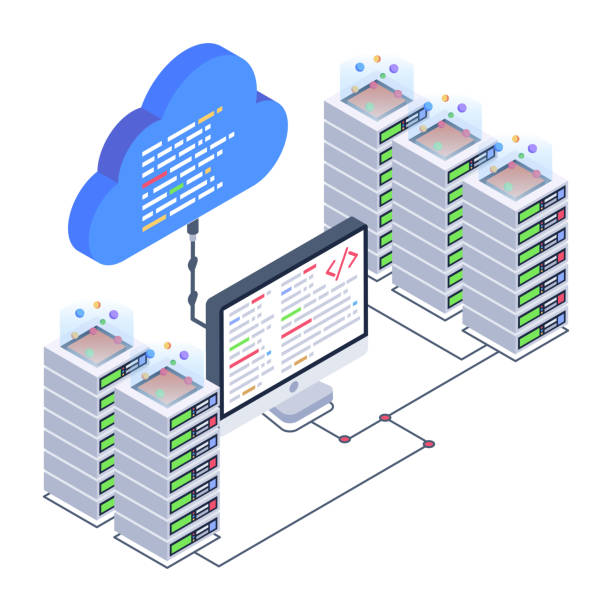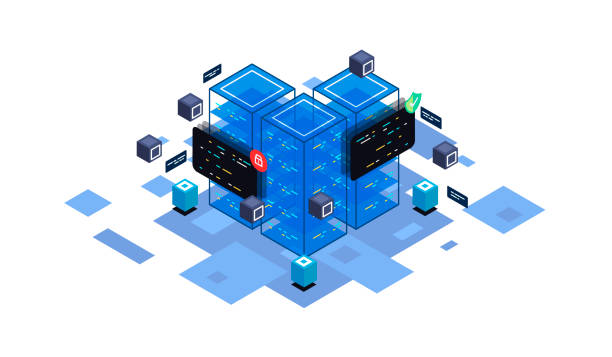Define the 5 server-based computing.

Server-based computing is a technology that has revolutionized the way businesses and organizations operate. It involves the use of central servers to provide access to applications and resources to multiple users, regardless of their location or device. This approach eliminates the need for individual installations and maintenance on each user’s computer, resulting in improved efficiency and cost-effectiveness. In this blog post, we will define the five main components of server-based computing and how they work together to create a seamless and efficient computing environment.
Understanding the Concept of Server-Based Computing
Think of server-based computing as a master puppeteer controlling all the action on a stage. In this scenario, the puppeteer is the server, and the puppets are your user devices – laptops, smartphones, tablets, and so on. This computing architecture hinges on the concept of offloading the heavy-lifting to the server while your user devices serve as mere interaction points. What does this mean? Simply put, your devices are freed from the burden of heavy processing. The server does all the hard work while your device displays the results. This is the essence of server-based computing.
Picture this: you’re using a software application on your device. In traditional computing, your device would handle all the processing associated with running the application. However, in a server-based setup, the bulk of the data processing happens at the server end. Your device, essentially, is the intermediary that communicates your instructions to the server and brings back the server’s output for you to interact with.
This is why server-based computing is such a game-changer. It brings simplicity, control, security, and power into one single package. Since most of the processing is done on the server, your device doesn’t need to have high-end specifications to run complex applications. In terms of control, since all data and applications are centralized in one place, managing them becomes significantly easier.
Security-wise, it is far easier to protect and monitor a single server than multiple devices scattered across different locations. And when it comes to power, servers are designed to handle heavy loads, making them much more robust than standard user devices.
So, whether it’s a dedicated server, a cloud server, a virtual private server, a shared server, or a clustered server, the fundamental idea remains the same – let the server do the hard work, while your device simply acts as the medium of interaction. This is server-based computing in a nutshell.
The Power of Dedicated Server Computing
Imagine having an entire server at your disposal, dedicated solely to your business or application. That’s the beauty of dedicated server computing. It’s like having your private island in the vast sea of data – a powerhouse of resources catering exclusively to your specific needs. The privilege of exclusivity offers total control over the server environment, allowing you to configure and customize to your heart’s content. It’s an ideal choice for heavy-duty applications and businesses dealing with confidential data. Imagine your data is a gold bar, wouldn’t you want the safest vault in town?
With dedicated server computing, you’re not sharing your space or resources with anyone else. It’s all yours, and that comes with some solid benefits. The performance is top-notch, unfettered by other users’ activities. You don’t have to worry about another organization’s sudden traffic surge slowing down your server or a cyber attack on a co-user compromising your security.

However, with great power comes great responsibility, and in the case of dedicated servers, this responsibility translates into management and maintenance. The onus is on you to ensure the smooth operation of your server. From timely updates to fixing technical glitches, the server’s wellbeing is in your hands.
Of course, the costs associated with this level of control and performance are significantly higher than shared or virtual servers. But if top-tier performance, control, and security are what you seek, a dedicated server could be your knight in shining armor.
Exploring the World of Cloud Server Computing
Cloud server computing is like a breath of fresh air in the landscape of IT infrastructure. It’s an innovative and dynamic solution, harnessing the power of the internet to provide you with a server that’s as agile as your business needs. The beauty of a cloud server lies in its fluidity – it’s designed to ebb and flow with your requirements, offering an elasticity that’s simply not possible with traditional servers.
One of the many compelling aspects of cloud servers is their scalability. Picture this – your business experiences an unexpected surge in traffic. Instead of worrying about your server’s capacity to handle this sudden spike, you can simply scale up your resources with the click of a button. And when the demand recedes, scale back down. It’s as easy as that. With cloud servers, you have the power to adapt instantly, ensuring your IT infrastructure is always perfectly aligned with your current needs.
Cloud servers are not just about scalability. They’re also synonymous with accessibility. With your applications and data hosted on the cloud, you can access them from any device, anywhere, anytime.
All you need is an internet connection. This level of access not only fosters collaboration but also facilitates remote working – a significant advantage in today’s increasingly mobile and flexible workforce.
One of the other trump cards of cloud server computing is its robust disaster recovery capabilities. Since data on a cloud server is backed up across multiple servers automatically, recovering it in the event of a disaster becomes a hassle-free task. No more nightmares about losing critical data due to server failure – your cloud server has got your back!
While cloud servers may seem like a perfect solution, they’re not for everyone. It’s crucial to weigh the pros and cons before making the leap. If your business values scalability, flexibility, accessibility, and robust disaster recovery, cloud server computing could be a perfect match. However, remember that every business is unique, and what works for one might not work for another. The key is to understand your specific needs and then choose a server solution that best aligns with them.
Unveiling the Potential of Virtual Private Servers
Stepping into the world of Virtual Private Servers (VPS) is like discovering a hidden oasis of balance. It’s here that you find the perfect harmony between the budget-friendliness of shared servers and the control plus power inherent to dedicated servers. Imagine a physical server, partitioned off into separate, virtual entities. Each one of these virtual servers possesses its own operating system and resources – like mini fortresses within a larger kingdom, each self-sufficient and strong.
But why is a VPS such a fascinating proposition? The answer lies in its versatility and scalability. It bends and sways to meet your unique requirements, scaling up or down with finesse and agility. One minute, it could be serving a start-up just dipping its toes into the market, and the next, it could be catering to a medium-sized enterprise embarking on an expansion spree. This chameleon-like ability to adapt and align with specific needs makes a VPS a favorite amongst a wide array of businesses.
In the bustling bazaar of server solutions, the VPS carves its niche by offering a middle path – a balanced blend of affordability, power, and control.
It’s a wonderful option if you’re seeking more control than a shared server can offer, but aren’t quite ready to invest in a dedicated server. It’s like a stepping stone, a transition point that offers a taste of the big leagues without overwhelming you.
Dive into the realm of Virtual Private Servers, and you might find the perfect match for your business needs. It’s the server solution that dares to straddle the line between shared and dedicated servers, offering a unique blend of features that could be just what your business needs to flourish. Remember, the power of server-based computing isn’t in the server itself, but in how effectively it aligns with your needs and objectives. And with a VPS, that alignment might be closer than you think.
The Simplicity of Shared Server Computing
Imagine boarding a city bus – it’s affordable, gets you to your destination, but you’re sharing the ride with other passengers. This is the essence of shared server computing. It’s an affordable, shared ride for your data and applications. In this setup, multiple users hitch a ride on the same server, sharing its resources like passengers share seats on a bus.
Shared servers are the perfect fit for those starting their digital journey. Perhaps you have a blog that you wish to take online or a small business that’s just venturing into the digital world. With shared server computing, you can secure a spot on the web without breaking the bank. The affordability factor is one of the significant charms of shared servers, making it an appealing choice for small businesses, personal websites, and startups.

However, just like a city bus can get crowded at peak times, a shared server can encounter performance issues if another site on the same server experiences a traffic surge or suffers a cyber attack. But don’t worry, most web hosts monitor their shared servers closely to manage the load and maintain a smooth user experience.
One of the significant benefits of shared servers is their user-friendliness. They often come with easy-to-use control panels and simple installation procedures, making it easy for beginners to navigate. Think of it as the friendly neighborhood bus driver who ensures you have a smooth journey, even if you’re new to the city.
While the shared server’s performance may not match that of a dedicated server or VPS, it still offers a reliable solution for less demanding applications and websites. After all, not everyone needs a limousine service; for many, the city bus gets the job done just as efficiently.
Remember, every bus ride is an adventure, and so is the journey on a shared server. If you’re looking for an affordable, user-friendly, and efficient server solution to embark on your digital journey, shared server computing could be your ticket to success. So, hop on and enjoy the ride!
Harnessing the Strength of Clustered Server Computing
In the realm of server-based computing, clustered servers are like a well-synchronized orchestra, each server playing its part in harmony to create a seamless performance. The beauty of this arrangement is that these servers operate as one unified system, ensuring optimum availability, scalability, and fault tolerance.
Just imagine if one instrument in the orchestra were to falter; the others pick up the slack to ensure the melody continues uninterrupted. Similarly, in a clustered server setup, if one server stumbles, the workload is seamlessly transferred to another server in the cluster, thus avoiding any disruption.
This dynamic model of server computing finds its sweet spot in sectors where the stakes of availability are high, such as the fast-paced world of e-commerce, the detail-oriented universe of banking, or the adrenaline-fueled realm of online gaming.
Imagine being in the middle of a thrilling gaming session or about to hit ‘confirm’ on a bank transaction, and your server crashes. Sounds like a nightmare, right? Clustered servers leap into action to prevent such scenarios, making sure your digital endeavors are never left hanging.
The strength of a chain lies in its weakest link, but what if the chain was designed so that there was no weak link?. That’s clustered server computing for you – a stronghold of servers, standing shoulder to shoulder, ready to tackle any obstacle that comes their way. So, if your business thrives on the ethos of ‘never say die,’ clustered server computing might be the server solution you need to harness. Go ahead, power your digital aspirations with the robust resilience of clustered servers, and let your business shine!



